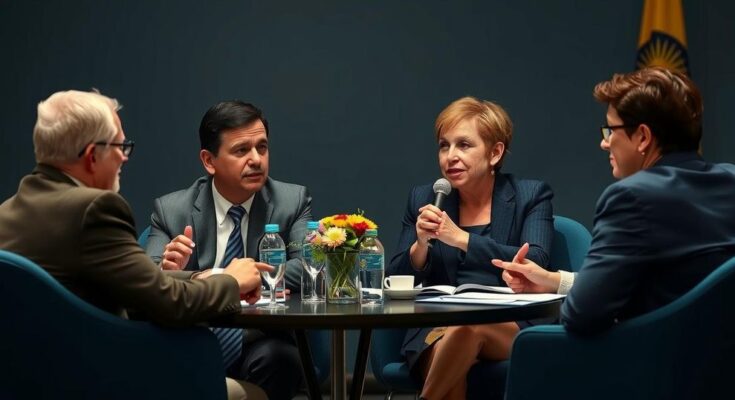Uruguay’s presidential run-off featured conservative Alvaro Delgado and left-wing candidate Yamandu Orsi in a peaceful election contrasting with regional turmoil. Orsi initially led but fell short of a majority, while Delgado benefited from third-party votes. Both candidates focused on economic issues and pledged to respect election results, highlighting Uruguay’s continued commitment to democratic stability.
In Uruguay, a presidential run-off was held between conservative candidate Alvaro Delgado and left-wing contender Yamandu Orsi. This election stands in stark contrast to the tumult elsewhere in Latin America, characterized by violence and protests in nations like Mexico and Venezuela. Uruguay, however, is regarded as a bastion of democratic stability, with elections that unfolded with relative calm on Sunday.
The run-off stemmed from the October 27 general election, where Orsi led with 44 percent, falling short of the 50 percent threshold required to avoid a decisive second round. Delgado emerged as the runner-up with 27 percent support, but with the backing of third-place finisher Andres Ojeda’s voters, he entered the run-off with renewed strength. Orsi, a 57-year-old history teacher, has the endorsement of former President Jose Mujica, who is revered on the left for his principled lifestyle and governance. The political landscape shifted in 2019 as the National Party regained power after nearly 15 years of Broad Front leadership.
The candidates’ campaigns focused on economic revitalization, with Orsi advocating for increased wages for low-income workers, while Delgado prioritized streamlining bureaucracy and enhancing international trade relations. Notably, both candidates expressed a commitment to uphold the election results and promote collaborative governance. Fernando Pereira, head of the Broad Front coalition, highlighted the importance of democratic coexistence by stating, “We must value what we have: democratic coexistence.” In a related commentary, Ojeda reflected on the peaceful nature of the election process, suggesting a foreign observer might not recognize the election was occurring.
Uruguay, situated along the southern Atlantic coast, north of Argentina, has carved a reputation as a model of democratic stability amid a turbulent Latin American political landscape. The country has faced challenges similar to its regional neighbors, yet it has managed to conduct its elections with a level of civility that is often lacking elsewhere. The recent elections represent a continuation of this trend, illustrating Uruguay’s commitment to democratic principles even as it encounters political competition between significant parties.
The recent presidential run-off in Uruguay exemplified the nation’s commitment to maintaining democratic processes despite the backdrop of regional instability. Both Alvaro Delgado and Yamandu Orsi presented strong economic proposals and emphasized cooperation regardless of the election outcome. The peaceful atmosphere of the election was remarked upon favorably, further solidifying Uruguay’s status as a paragon of democracy in Latin America. Observers noted how this electoral process could serve as a potential model for other nations facing political strife.
Original Source: www.aljazeera.com




